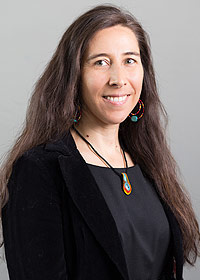MEZCOPH Researcher Awarded a NSF Ethical and Responsible Research grant

Stephanie Carroll, DrPH
In order to address barriers that have historically impeded ethical and responsible research (ER2) practices, research institutions must foster a culture of integrity and trustworthiness. Stephanie Russo Carroll DrPH, MPH, received a 4-year national science foundation ethical and responsible research grant, called “An Indigenous data governance approach for enhancing ethical research policies and practices” (SES 2024269) which builds on multiple NSF and other research projects.
Dr. Carroll plans to apply an innovative Indigenous data governance framework to review institutional norms and practices that promote or inhibit ethical design, outcomes, and approaches across the STEM research landscape. Funding for this grant comes through RII/Udall Center for Public Policy and the Native Nations Institute. The research team comprises scholars from a diverse array of disciplines across campus, including Dr. John Hildebrand (neuroscience), Dr. Jane Bambauer (data law), Dr. Dominique David-Chavez (climate sciences), Ibrahim Garba (Indigenous law and bioethics), and Mercury Fox (data policy), as well as Noor Johnson (Arctic sciences) University of Colorado Boulder. The project also relies on an international expert-practitioner advisory board. Dr. Carroll’s research goal is to advance university policies to improve research and data cultures.
A pivotal feature of the project is bi-directional engagement of relevant constituents, rightsholders, and stakeholders in developing indicators, factors, and resources. Indigenous and mainstream experts as well as Indigenous leaders and community members will have opportunities not only to provide information in the project’s early stages and to use the guidelines after completion, but also to participate in the co-development of the guidelines. In adopting this feature, the project models one of various approaches to the collaborative creation of knowledge, in addition to providing guidance on developing institutional policies that support ethical and responsible research and data practices.
Dr. Carroll says, “This project will enhance the recognition and promotion of Indigenous rights and interests in the research enterprise, and in turn will offer guidance to strengthen universities’ policies and practices to support trustworthy researchers who engage multiple ways of knowing in their collaborations.”
Stephanie Russo Carroll (Ahtna), DrPH, MPH, is Assistant Professor, Public Health Policy and Management at the Community, Environment and Policy Department at MEZCOPH, Assistant Research Professor, Udall Center for Studies in Public Policy (UC), Assistant Professor American Indian Studies Graduate Interdisciplinary Program; Associate Director and Manager-Tribal Health Program for Native Nations Institute (NNI) in the UC; and Co-Director for the Center for Indigenous Environmental Health Research (CIEHR), MEZCOPH at the University of Arizona.
Stephanie's research explores the links between Indigenous governance, data, the environment, and community wellness. Her interdisciplinary lab group, the Collaboratory for Indigenous Data Governance Research, develops research, policy, and practice innovations for Indigenous data sovereignty.

